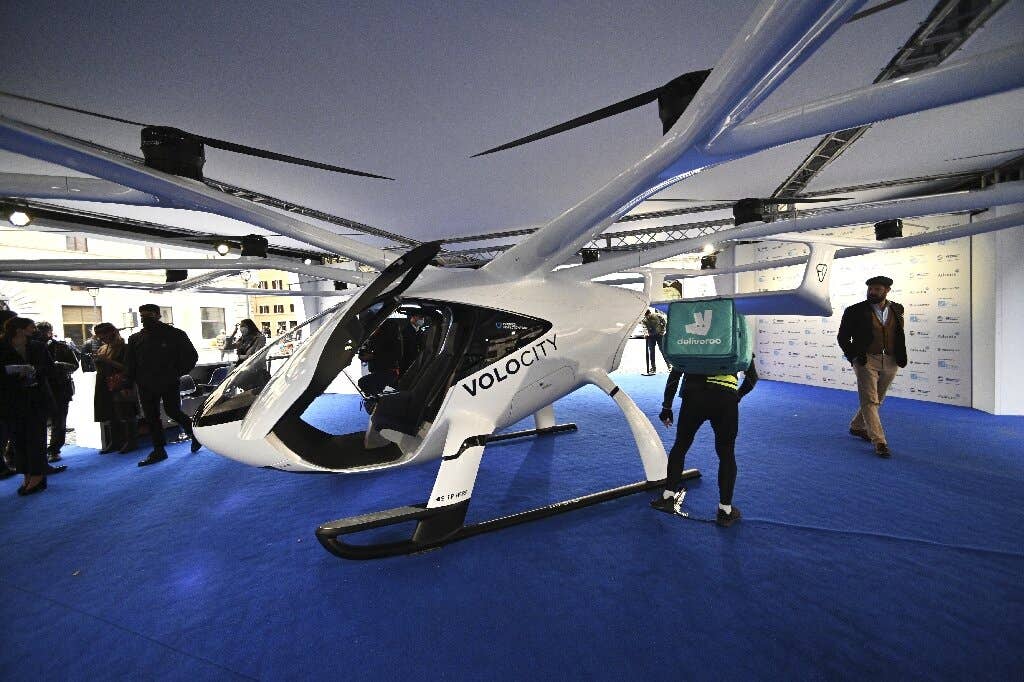Air taxis promised to fly above potholes of Rome
With streets filled with potholes and soul-crushing traffic on the ground in the Eternal City, some say the only way is up.

[Nov 4, 2021: The Brighter Side of News]
The VoloCity air taxi on display in central Rome. (CREDIT: VoloCity)
With streets filled with potholes, buses erupting in flames and soul-crushing traffic on the ground in the Eternal City, some say the only way is up.
A new electric air taxi could be transporting passengers from Rome's Fiumicino Airport to the city centre within three years, according to German company Volocopter, Rome's airport operator ADR and transportation infrastructure holding company Atlantia.
The project, called VoloCity—which is also planned for Paris and Singapore—promises to whisk people from the airport to the city in 20 minutes, with no traffic and zero emissions, travelling at a maximum speed of 110 kilometres per hour.
Related Stories
Initially, the taxi will carry the pilot plus one passenger, "until the aircraft will fly completely autonomously," when it will be able to take two passengers, read a joint press release announcing plans.
Still required for the Fiumicino project is the development of "vertiports" to allow the taxis to take off and land vertically.
In Rome on Thursday, the gleaming white Volocopter flying taxi was parked in a square near the Trevi Fountain where curious onlookers were allowed to board.
"I would have liked them to have thought more about the railway system before going up into the sky," said 32-year-old Giuseppe, who declined to give his last name.
Still, he conceded: "This is a leap into the future. We talk about going to Mars, so this is the least we can do."
Local news reports put the price of the planned 20-minute ride from Fiumicino to the city centre at 140 euros ($161), compared to a taxi, which costs 48 euros, or a 32-minute train for 14 euros.
Italy's ancient capital suffers from a notoriously creaky public transportation system, with pothole-laden roads that wreak havoc on tyres, ageing buses that sporadically go up in flames and metro stations often shuttered for months.
The idea of flying taxis—eventually without pilots—has spread worldwide, part of a push to ease congestion on roads and limit pollution.
Various companies, including ride-services giant Uber and automaker General Motors, are working on "vertical take off and landing aircraft" (VTOL), but major challenges remain, including regulatory issues and safety concerns.
Like these kind of feel good stories? Get the Brighter Side of News' newsletter.
Tags: #New_Innovations, #Flying_Cars, #Taxi, #Science, #Technology, #Global_Good_News, #The_Brighter_Side_of_News
Joseph Shavit
Head Science News Writer | Communicating Innovation & Discovery
Based in Los Angeles, Joseph Shavit is an accomplished science journalist, head science news writer and co-founder at The Brighter Side of News, where he translates cutting-edge discoveries into compelling stories for a broad audience. With a strong background spanning science, business, product management, media leadership, and entrepreneurship, Joseph brings a unique perspective to science communication. His expertise allows him to uncover the intersection of technological advancements and market potential, shedding light on how groundbreaking research evolves into transformative products and industries.



